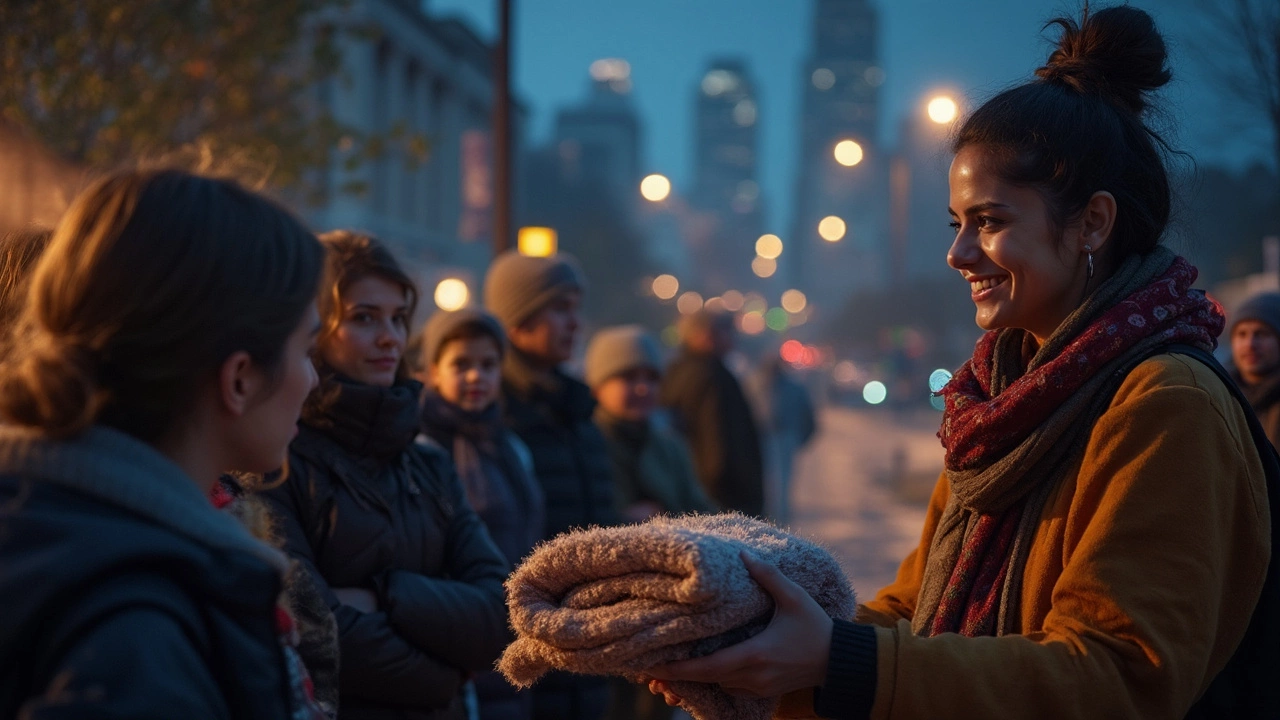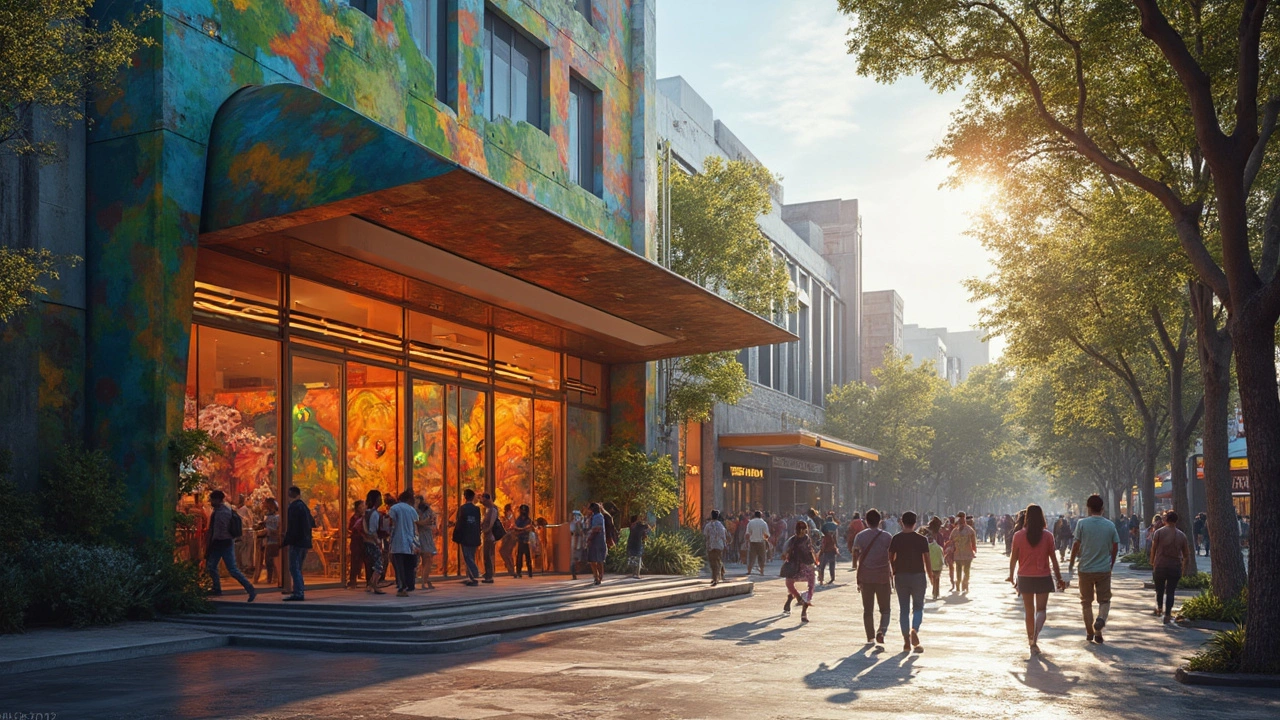Best Places to Go When Homeless: Finding Safe Shelters
 Apr, 12 2025
Apr, 12 2025
Being homeless is a situation that no one ever wishes to find themselves in, yet it happens to many. When faced with the challenge of not having a home, the immediate concern is: where do you go? Finding a safe place is crucial and, believe it or not, there are resources out there designed to help.
First things first, safety is your top priority. Look for well-established shelters. In places like Melbourne, there are organizations with the sole focus on providing a safe space to stay. Always ensure that the shelter is registered and recognized as legitimate.
Moreover, shelters aren't just about having a roof over your head—they're loaded with services. Many offer meals, access to showers, and sometimes even help with finding jobs or training programs. It's more than just a bed; it's a stepping stone towards a more stable future.
Networking can be a helpful tool. Chat with other people in the homeless community or with local help groups. They often know which shelters are best, and where you'll be treated with respect and dignity. Each shared story can be a guiding light in finding the right path for you.
- Recognizing Safe Shelters
- Top Shelters in Melbourne
- Tips for Finding Aid
- Day-to-Day Living Advice
- Staying Safe and Healthy
Recognizing Safe Shelters
Alright, so you're on the hunt for a shelter. How do you figure out which ones are truly safe? You're looking for stability, somewhere that won’t just support you for a night but gives you a decent start. Here’s what to keep an eye out for:
Registered and Recognized: First and foremost, check if the homeless shelter is registered. You can usually find this info online or through local councils. A registered shelter is accountable and usually follows a set of standards.
Location Matters: Consider location, especially in Melbourne. You want a place that's easily accessible by public transport and close to other resources like healthcare centers and food services. A shelter in a bustling area often means better facilities and more frequent patrols, which can add to your peace of mind.
Services Offered: A quality shelter offers more than a bed. Look for places that provide meals, hygiene facilities, and support programs. Those connected to local aid organizations might help with job placements or training opportunities.
- Check if they have counseling or mental health services.
- Look for places offering case workers to help plan your next steps.
- Some have partnerships with local clinics, which can be a lifesaver.
Community Reputation: The word on the street matters. Talk to people who have stayed there; their experiences can give you a true picture of what to expect. Shelters with a good community reputation usually mean safer and more supportive environments.
Now, a bit more specific stuff: Shelters like The Salvation Army in Melbourne have been known to provide a comprehensive support system, offering not just a place to sleep but also connections to long-term housing solutions. While at them, also check out their volunteer involvement—more volunteers often mean more support and a more welcoming atmosphere.
| Year | Shelters Open | Shelters Closed |
|---|---|---|
| 2023 | 15 | 3 |
| 2024 | 20 | 2 |
In your journey to find a safe space, remember—knowing what to look for can make all the difference. Pick wisely, and you'll be on solid ground to get back on your feet.
Top Shelters in Melbourne
Melbourne is known for its vibrant community and support networks, and when it comes to helping the homeless, the city truly steps up. If you're looking for a safe haven, here's a rundown on some of the top homeless shelters in the city.
The Salvation Army is a name that pops up again and again for a good reason. Their Project 614 initiative based in Bourke Street is a hub for those needing shelter, meals, and even counseling services. They focus on creating a supportive environment where everyone can feel valued.
Another strong pillar in the community is Launch Housing. They have several locations, including Southbank and Collingwood, and are known for providing not just accommodation but a pathway to more permanent housing solutions. They offer tailored support services to help individuals get back on their feet.
If you're in the Outer East, check out Anchor. This organization specializes in helping families and youths in crisis. They provide temporary shelters and work closely with clients to find long-term housing solutions.
For a more community-based approach, St Mary’s House of Welcome offers a drop-in center in Fitzroy, providing meals, showers, and a place to relax, alongside connections to social activities and skilled staff who are ready to support.
Lastly, let's not forget about VincentCare. Situated conveniently in North Melbourne, they have a committed team focused on both immediate crisis accommodation and long-term recovery programs. They emphasize holistic support, tackling both housing and health needs.
Here's a quick snapshot of these shelters:
| Shelter Name | Location | Speciality |
|---|---|---|
| The Salvation Army | Bourke Street | Holistic support |
| Launch Housing | Southbank, Collingwood | Long-term housing solutions |
| Anchor | Outer East | Family and youth crisis |
| St Mary’s House of Welcome | Fitzroy | Community support |
| VincentCare | North Melbourne | Health and housing |
Finding yourself without a permanent home is never easy, but knowing about these top-notch resources can offer some much-needed relief. Each of these shelters is committed to providing support and dignity, helping those in need find a path to stability.

Tips for Finding Aid
When you’re struggling with homelessness, finding help can seem overwhelming. But knowing where to look and how to ask for assistance can really make a difference. Melbourne, like many cities, offers a range of resources for those without a permanent home.
Start with local councils; they often have information on available homeless shelters and services. Each council might have different offerings, so it's worth checking their websites or asking at their offices for information tailored to your area.
Another key place to seek help is through community centers and local charities. These organizations often run outreach programs specifically designed to aid the homeless. They can provide you with food, clothing, hygiene products, and in some cases, even temporary shelter.
There are also government-funded services, like Centrelink, which can offer financial support or at least guide you to the right aid. Don’t hesitate to contact them for advice; they’re familiar with the different pathways available to help you get back on your feet.
Keeping these steps in mind can make a real difference:
- Connect with local councils for shelter information.
- Reach out to community centers and charities.
- Utilize government services like Centrelink for guidance.
Remember, you’re not alone in this. Many have walked this path and found ways to secure a safe place to stay. It's about taking that first step and connecting with the resources around you. Stay informed and don't be afraid to ask for help.
Day-to-Day Living Advice
Waking up each day without a permanent place to call home can feel overwhelming. But it's important to focus on practical steps that can help you get through each day safely and keep moving forward. Here's some advice that can make life a bit more manageable.
Firstly, keep your personal items organized. Using a sturdy backpack or a few tote bags can help you easily manage your belongings. Consider storing your valuables in a secure pocket or lightweight lockbox.
Staying clean and healthy is key, too. Look into community centers, gyms, or shelters that offer showers and sanitation facilities. If you have a phone, mobile apps can help you locate nearby facilities and meal programs.
- Eating Well on a Budget: Many shelters and community kitchens offer meals. Learn the schedules and try to plan your day around meal times. Carry non-perishable snacks like nuts or protein bars for emergencies.
- Access to Clothing: Some thrift stores or local aid organizations provide free clothing. Keep an eye out for seasonal clothing drives.
- Staying Connected: Charge your phone whenever possible, and consider free email services to stay in touch with family or potential employers.
Remember that you’re not alone. Building connections with local support organizations might connect you with others facing similar issues. Volunteering at these places, when you can, might also lead to friendships and useful networking opportunities.
Lastly, mental health should be a priority. Look for free counseling or support groups. They can be a great outlet to talk about your experiences and find emotional support.
Your day-to-day life doesn't have to be solitary or hopeless. With some planning and using available resources, you can navigate this tough time effectively.

Staying Safe and Healthy
Being homeless presents many challenges, and staying safe and healthy is one of the most important. Always prioritize safety by choosing well-lit and populated areas if you're spending time outside when homeless shelters are full or inaccessible. Trust your instincts. If a place doesn't feel right, it’s probably not.
Keeping healthy is crucial too. It's easy to overlook when your focus is on finding a safe spot to rest, but it’s vital for weathering tough times. Access to nutritious food might be tricky, so try to hit shelters or community meal services that offer balanced meals. Many shelters provide not just food, but also healthcare services. If something feels off health-wise, get it checked. Your health matters.
Stay hydrated. Water might seem basic, but it can be surprisingly hard to come by. Carry a refillable bottle, and when you spot a fountain or tap, fill up. Dehydration can sneak up on you, especially in Melbourne's summer heat.
Grooming and hygiene might sound non-essential when you're focused on immediate needs, but they're crucial for maintaining self-esteem and preventing illnesses. Hit public bathrooms for a quick wash or a shave. Shelters often provide access to showers and hygiene products, so tap into these resources.
Let's not forget staying connected. Many libraries offer free internet access, which can be a lifeline for staying in touch with support services or checking for job opportunities. Having a charged phone helps, so recharge whenever you find an outlet, whether in a library or a café that’s cool with it.
If you’re up for it, walking or light exercise is another way to maintain health. It’s free, and getting outside can clear the mind. Plus, it’s a chance to explore new areas where you might find helpful resources or friendly faces.